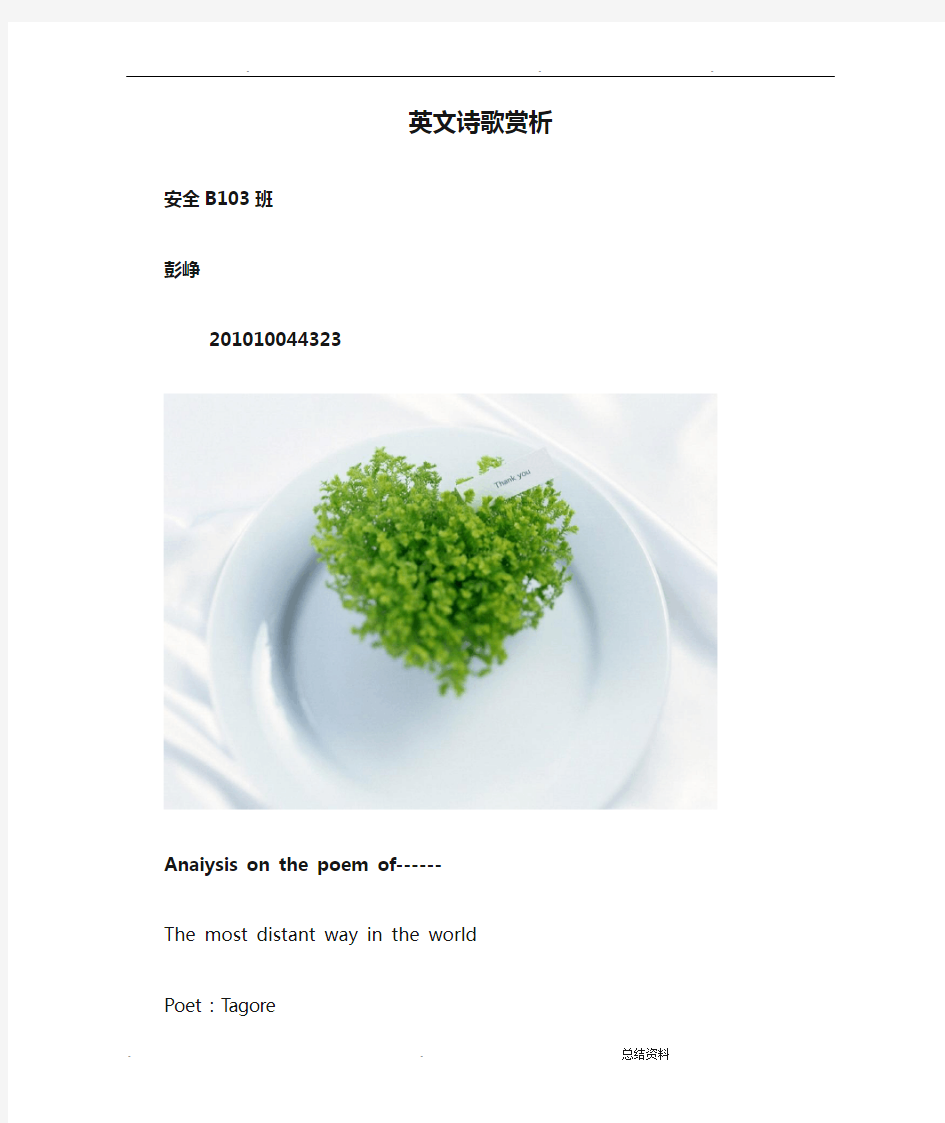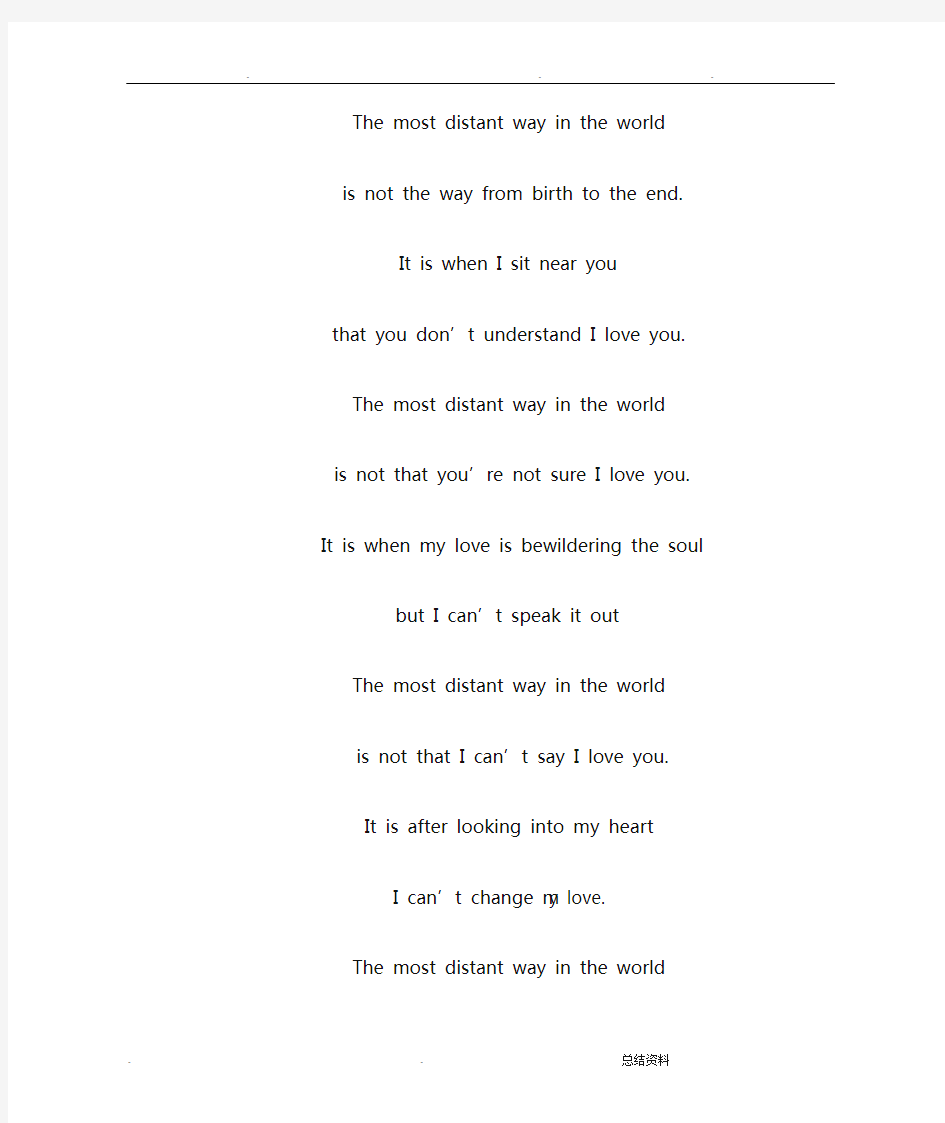英文诗歌赏析


英文诗歌赏析安全B103班
彭峥201010044323
Anaiysis on the poem of------
The most distant way in the world
Poet:Tagore
The most distant way in the world
is not the way from birth to the end.
It is when I sit near you
that you don’t understand I love you.
The most distant way in the world
is not that you’re not sure I love you.
It is when my love is bewildering the soul
but I can’t speak it out
The most distant way in the world
is not that I can’t say I love you.
It is after looking into my heart
I can’t change my love.
The most distant way in the world
is not that I’m loving you.
It is in our love
we are keeping between the distance.
The most distant way inthe world
is not the distance across us.
It is when we’re breaking through the way we deny the existance of love.
So the most distant way in the world is not in two distant trees.
It is the same rooted branches
can’t enjoy the co-existance.
So the most distant way in the world is not in the being sepearated branches.
It is in the blinking stars
they can’t burn the light.
So the most distant way in the world
is not the burning stars.
It is after the light
they can’t be seen from afar.
So the most distant way in the world
is not the light that is fading away.
It is the coincidence of us
is not supposed for the love.
So the most distant way in the world
is the love between the fish and bird.
One is flying at the sky,
the other is looking upon into the sea.
Rabindranath Tagore (1861-1941) was the youngest son of Debendranath Tagore, a leader of the Brahmo Samaj, which was a new religious sect in nineteenth-century Bengal and which attempted a revival of the ultimate monistic basis of Hinduism as laid down in the Upanishads. He was educated at home; and although at seventeen he was sent to England for formal schooling, he did not finish his studies there. In his mature
years, in addition to his many-sided literary activities, he managed the family estates, a project which brought him into close touch with common humanity and increased his interest in social reforms. He also started an experimental school at Shantiniketan where he tried his Upanishadic ideals of education. From time to time he participated in the Indian nationalist movement, though in his own non-sentimental and visionary way; and Gandhi, the political father of modern India, was his devoted friend. Tagore was knighted by the ruling British Government in 1915, but within a few years he resigned the honour as a protest against British policies in India.
Tagore had early success as a writer in his native Bengal. With his translations of some of his poems he became rapidly known in the West. In fact his fame attained a luminous height, taking him across continents on lecture tours and tours of friendship. For the world he became the voice of India's spiritual heritage; and for India, especially for Bengal, he became a great living institution.
Although Tagore wrote successfully in all literary genres, he was first of all a poet. Among his fifty and odd volumes of poetry are Manasi (1890) [The Ideal One], Sonar Tari (1894) [The Golden Boat], Gitanjali (1910) [Song Offerings], Gitimalya (1914) [Wreath of Songs], and Balaka (1916) [The Flight of Cranes]. The English renderings of his poetry, which include The Gardener (1913), Fruit-Gathering (1916), and The Fugitive (1921), do not generally correspond to particular volumes in the original Bengali; and in spite of its title, Gitanjali: Song Offerings (1912), the most acclaimed of
them, contains poems from other works besides its namesake. Tagore's major plays are Raja (1910) [The King of the Dark Chamber], Dakghar (1912) [The Post Office], Achalayatan (1912) [The Immovable], Muktadhara (1922) [The Waterfall], and Raktakaravi (1926) [Red Oleanders]. He is the author of several volumes of short stories and a number of novels, among them Gora (1910), Ghare-Baire (1916) [The Home and the World], and Yogayog (1929) [Crosscurrents]. Besides these, he wrote musical dramas, dance dramas, essays of all types, travel diaries, and two autobiographies, one in his middle years and the other shortly before his death in 1941. Tagore also left numerous drawings and paintings, and songs for which he wrote the music himself.
From Nobel Lectures, Literature 1901-1967, Editor Horst Frenz, Elsevier Publishing Company, Amsterdam, 1969
This autobiography/biography was written at the time of the award and first published in the book series Les Prix Nobel. It was later edited and republished in Nobel Lectures. To cite this document, always state the source as shown above.
Rabindranath Tagore died on August 7, 1941.
Greatest writer in modern Indian literature, Bengali poet, novelist, educator, and an early advocate of Independence for India. Tagaore won the Nobel Prize for Literature in 1913. Two years later he was awarded the knighthood, but he surrendered it in 1919 as a protest against the Massacre of Amritsar, where British troops killed some 400 Indian demonstrators. Tagore's influence over Gandhi and the founders of modern India was enormous, but his reputation in the West as a mystic has perhaps mislead his Western readers to ignore his role as a reformer and critic of colonialism.
"When one knows thee, then alien there is none, then no door is shut. Oh, grant me my prayer that I may never lose touch of the one in the play of the many." (from Gitanjali) Rabindranath Tagore was born in Calcutta into a wealthy and prominent family. His father was Maharishi Debendranath Tagore, a religious reformer and scholar. His mother, Sarada Devi, died when Tagore was very young - he realized that she will never come back was when her body was carried through a gate to a place where it was burned. Tagore's grandfather had established a huge financial empire for himself. He helped a number of public projects, such as Calcutta Medical College.
The Tagores tried to combine traditional Indian culture with Western ideas; all the children contributed significantly to Bengali literature and culture. However, in My Reminiscences Tagore mentions that it was not until the age of ten when he started to
use socks and shoes. And servants beat the children regularly. Tagore, the youngest, started to compose poems at the age of eight. Tagore's first book, a collection of poems, appeared when he was 17; it was published by Tagore's friend who wanted to surprise him.
Tagore received his early education first from tutors and then at a variety of schools. Among them were Bengal Academy where he studied history and culture. At University College, London, he studied law but left after a year - he did not like the weather. Once he gave a beggar a cold coin - it was more than the beggar had expected and he returned it. In England Tagore started to compose the poem 'Bhagna Hridaj' (a broken heart).
In 1883 Tagore married Mrinalini Devi Raichaudhuri, with whom he had two sons and three daughters. In 1890 Tagore moved to East Bengal (now Bangladesh), where he collected local legends and folklore. Between 1893 and 1900 he wrote seven volumes of poetry, including SONAR TARI (The Golden Boat), 1894 and KHANIKA, 1900. This was highly productive period in Tagore's life, and earned him the rather misleading epitaph 'The Bengali Shelley.' More important was that Tagore wrote in the common language of the people. This also was something that was hard to accept among his critics and scholars.
Tagore was the first Indian to bring an element of psychological realism to his novels.
Among his early major prose works are CHOCHER BALI (1903, Eyesore) and NASHTANIR (1901, The Broken Nest), published first serially. Between 1891 and 1895 he published forty-four short stories in Bengali periodical, most of them in the monthly journal Sadhana.
Especially Tagore's short stories influenced deeply Indian Literature. 'Punishment', a much anthologized work, was set in a rural village. It describes the oppression of women through the tragedy of the low-caste Rui family. Chandara is a proud, beautiful woman, "buxom, well-rounded, compact and sturdy," her husband, Chidam, is a farm-laborer, who works in the fields with his brother Dukhiram. One day when they return home after whole day of toil and humiliation, Dukhiram kills in anger his sloppy and slovenly wife because his food was not ready. To help his brother, Chidam's tells to police that his wife struck her sister-in-law with the farm-knife. Chandara takes the blame on to herself. 'In her thoughts, Chandara was saying to her husband, "I shall give my youth to the gallows instead of you. My final ties in this life will be with them."' Afterwards both Chidam and Dukhiram try to confess that they were quilty but Chandara is convicted. Just before the hanging, the doctor says that her husband wants to see her. "To hell with him," says Chandara.
In 1901 Tagore founded a school outside Calcutta, Visva-Bharati, which was dedicated to emerging Western and Indian philosophy and education. It become a university in 1921. He produced poems, novels, stories, a history of India, textbooks, and treatises
on pedagogy. Tagore's wife died in 1902, next year one of his daughters died, and in 1907 Tagore lost his younger son.
Tagore's reputation as a writer was established in the United States and in England after the publication of GITANJALI: SONG OFFERINGS, about divine and human love. The poems were translated into English by the author himself. In the introduction from 1912 William Butler Yates wrote: "These lyrics - which are in the original, my Indians tell me, full of subtlety of rhythm, of untranslatable delicacies of colour, of metrical invention - display in their thought a world I have dreamed of all my life long." Tagore's poems were also praised by Ezra Pound, and drew the attention of the Nobel Prize committee. "There is in him the stillness of nature. The poems do not seem to have been produced by storm or by ignition, but seem to show the normal habit of his mind. He is at one with nature, and finds no contradictions. And this is in sharp contrast with the Western mode, where man must be shown attempting to master nature if we are to have "great drama." (Ezra Pound in Fortnightly Review, 1 March 1913) However, Tagore also experimented with poetic forms and these works have lost much in translations into other languages.
Tagore wrote his most important works in Bengali, but he often translated his poems into English. At the age of 70 Tagore took up painting. He was also a composer, settings hundreds of poems to music. Many of his poems are actually songs, and inseparable from their music. Tagore's 'Our Golden Bengal' became the national anthem of
Bangladesh. Only hours before he died on August 7, in 1941, Tagore dictated his last poem. His written production, still not completely collected, fills nearly 30 substantial volumes. Tagore remained a well-known and popular author in the West until the end of the 1920s, but nowadays he is not so much read.
